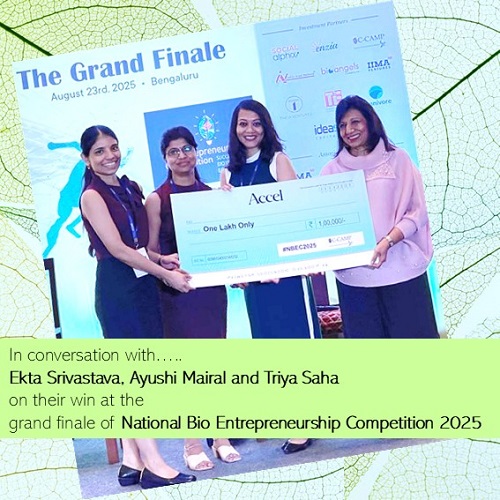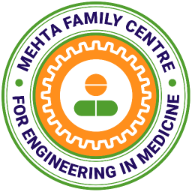
In conversation with....
Ekta Srivastava, Ayushi Mairal and Triya Saha
on their win at the grand finale of National Bio Entrepreneurship Competition 2025
MFCEM: Ekta, Ayushi and Triya a big congratulations to you and your mentor Prof. Ashok Kumar. It must feel good to come out as winners from around 750 entries. Could you briefly tell us about the innovation/technology for which you were recognized. How do you intend to take the innovation forward from here?
Ekta/ Ayushi/Triya: Thank you so much! We feel truly honoured and humbled to be selected from among 750 outstanding entries. We received this award for our entrepreneurship venture Regenacure, which is focused on providing tissue engineering-based solutions for spinal cord injury. We are extremely grateful to our mentor Prof. Ashok Kumar who motivated us to participate in the competition and under his guidance, we emerged as winner team.
Our core innovation, called Electrogel, is an aligned, reduced graphene oxide-functionalized cryogel scaffold. It is designed to mimic the native nerve architecture and conduct bioelectric signals, which are critical for neural regeneration. Electrogel supports axonal guidance and reconnection in spinal cord injuries. Importantly, when paired with intraoperative electrical stimulation, it has shown promising results in preclinical models, facilitating neural growth and enabling functional motor recovery in both compression and transection injury models in rats. Going forward, we are now in phase of translating this innovation into a clinically viable therapy. Our immediate focus is on scaling up manufacturing, conducting advanced preclinical validations. Ultimately, our vision is to bridge the gap between laboratory innovation and patient care by offering a first-in-class regenerative solution for spinal cord injury patients
MFCEM: Each of you are pursuing a distinct research topic for your individual Ph.D. degrees how did you converge as a team to pitch a common idea? How did you work out a meeting point?
Ekta/ Ayushi/Triya: Each of us is pursuing a distinct research problem for our Ph.D. degrees, Ekta’s Ph.D. work focuses on spinal cord injury, Ayushi focuses on inflammatory bowel disease regimens and Triya’s work include therapeutic solutions for chronic liver disease. At first glance, these areas may look very different, but the common thread is our shared expertise in biomaterial-based therapeutics. This became our meeting point. We as a team realized that by integrating our platforms, we could offer novel, targeted, and scientifically validated solutions for some of the most challenging chronic diseases.
Together, we developed an integrated innovation pipeline:
- Electrogel for spinal cord injury repair using a bioelectric and structurally aligned cryogel scaffold
- TofaMucoHeal for IBD using a mucoadhesive, thermo-responsive drug delivery hydrogel
- BioNano Spray for liver regeneration through photo-crosslinkable, exosome-loaded hydrogels
All three technologies are supported by strong scientific data, patents, and preclinical validation and supported by government funding agency ICMR. However, while building our venture for this National BioEntreprenurship Competition, we had to identify a single lead product to take forward first. We chose Electrogel, because it has CTRI registration and ethical clearance for human trials, which positions it closest to translation and clinical impact. The other two platforms are a strong part of our pipeline and long-term vision for Regenacure, being in the process of receiving the approvals. Starting with Electrogel allows us to establish a clinical footprint and demonstrate real-world patient outcomes and paves the way for the liver and IBD solutions.
MFCEM: How does this recognition help you? Does it make transition from a Bioengineer to a BioEntrepreneur a little easier? What are your thoughts on the current Bioentrepreneur ecosystem in India, would you encourage other researchers to explore translation potential of their research findings?
Ekta/ Ayushi/Triya: This recognition is a tremendous encouragement as it validates the translational potential of our work and gives us visibility beyond academia, which has always been Ashok sir’s vision. It certainly makes the transition from Bioengineer to BioEntrepreneur a little easier by opening doors to mentorship, networking, and investor connect opportunities that are critical for moving innovations from lab to clinic. The bioentrepreneurship ecosystem in India is steadily growing with strong support from several initiatives by Government of India, still challenges in long-term funding and regulatory pathways remain a bottle neck. We would definitely encourage fellow researchers to think beyond publications and explore the translational potential of their research as lab innovations can create a significant impact when transformed into patient-centered solutions.
MFCEM: Thank you Ekta, Ayushi and Triya for sharing your thoughts. Wishing you all the best for your future endeavors.
We thank MFCEM for the opportunity and motivating us with this gesture!

